4 ways this technology can help improve your life.
Betting that AI could lighten the clinician load.
Home Instead goal: Applying technology to make home care more efficient.
Mountain Empire serves about 3,000 people in Appalachia providing meals, transportation and personal care.
Five main obstacles that could hinder the responsible adoption of AI-based technologies and propose strategies to address them.

 Kudos to the Forbes Technology Council! Their post,
Kudos to the Forbes Technology Council! Their post,  The gap between some older adults and the devices/software they need does not narrow. As AARP responders noted in their survey,
The gap between some older adults and the devices/software they need does not narrow. As AARP responders noted in their survey,  Each of several recent years, AARP has surveyed older adults about tech use. This year’s
Each of several recent years, AARP has surveyed older adults about tech use. This year’s  The tech user experience – still flawed and in need of fixing. As noted in the May report,
The tech user experience – still flawed and in need of fixing. As noted in the May report,  An old report, the core concept of Connected Living was excellent and predictive. Thirteen years ago, AARP sponsored research that posed questions about technology’s future role in connecting older adults with families, resources and each other. With input from 30 industry experts, the research attempted to determine how technology could better serve older adults moving forward. The result was a 2011 report called
An old report, the core concept of Connected Living was excellent and predictive. Thirteen years ago, AARP sponsored research that posed questions about technology’s future role in connecting older adults with families, resources and each other. With input from 30 industry experts, the research attempted to determine how technology could better serve older adults moving forward. The result was a 2011 report called  The tech user experience for all ages is mostly depressing. A few delighters here and there break up a constant struggle to produce the right command, find the right part of the right website, and overcome the insanity of bug-fixing updates after updates. And that is if you are well-trained and proficient. Whether it is a phone, a tablet, or a much-needed website, we curse and complain – and then there’s another software update and a new set of complaints. We struggle with appliance and car interfaces, trying to understand the rationale for buttons and screens that are cluttered with too much information. Stay tuned for the May, 2024 report about these user experiences and what can be done to improve them. The April blogs:
The tech user experience for all ages is mostly depressing. A few delighters here and there break up a constant struggle to produce the right command, find the right part of the right website, and overcome the insanity of bug-fixing updates after updates. And that is if you are well-trained and proficient. Whether it is a phone, a tablet, or a much-needed website, we curse and complain – and then there’s another software update and a new set of complaints. We struggle with appliance and car interfaces, trying to understand the rationale for buttons and screens that are cluttered with too much information. Stay tuned for the May, 2024 report about these user experiences and what can be done to improve them. The April blogs: What happens when engineers believe that no matter what, the customers will buy? Rant on. Look at the forum
What happens when engineers believe that no matter what, the customers will buy? Rant on. Look at the forum